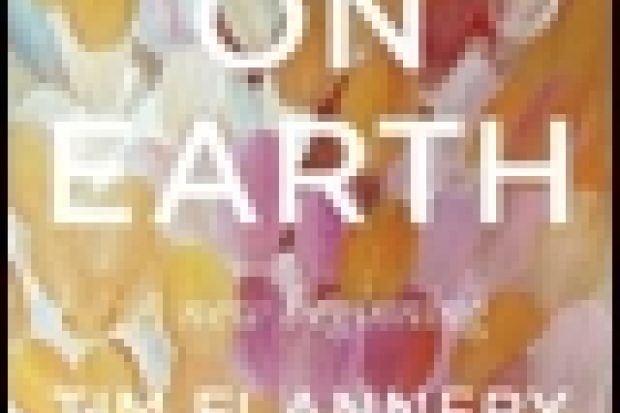A long view gives a better perspective on our current concerns than the experience of a single lifetime. How long? Millennia for humanity and aeons for the world, says Tim Flannery. That is because the right time frame for thinking about our environmental prospects is not only ecological, but also evolutionary.
Moreover, it calls for a particular reading of evolutionary theory, one that Flannery ascribes to Alfred Russel Wallace rather than Charles Darwin. It is one in which natural selection leads to co-evolution and cooperation, in spite of the selfishness of genes. Eventually it leads to Gaia theory, in which self-regulating Earth systems maintain conditions hospitable for life through planetary homeostasis.
This is an ambitious synthesis, sketched in Here on Earth's first 70 pages as a backdrop to an equally ambitious review of the impact that Homo sapiens has made on this system. The two are bridged by a brief invocation of memes - units of culture somehow subject to selection - or "mnemes", as Flannery prefers to call them, after a coinage that predates their recent formulation by Richard Dawkins. The alternative spelling does not stop the idea seeming as confused as it is confusing.
But they are a minor part of Flannery's big story. Human history, as he sees it, is largely a tale of destruction. We have, however, also managed to create "superorganisms" - Flannery's term for the co-evolving, carefully managed ecosystems of agriculture - along with civilisation and cities. The big 21st-century question, of course, is whether these can be preserved and developed further to lift one-quarter of our species out of poverty.
His answer, developed over the book's second half, is not entirely clear. He goes on bringing in new topics - demographics, pollution, the failings of conventional economics, the causes of war, the promise of technology - but treats them rather superficially.
Perhaps the biggest immediate problem, climate change, will be alleviated by reforestation, burying charcoal in the soil, low-till and drip-fed agriculture and smart power grids, all of which Flannery favours. But it would take a more detailed examination to show their real potential. Their role here seems intended mainly to be inspirational. If we pursue the right ideas (mnemes again), we can still make a sustainable global civilisation a reality.
Ultimately the book justifies its title, but not its subtitle. It does not offer a new beginning - it is hard to see how it could. The evolutionary-cum-historical approach helps to suggest that one might be possible. But it does not suggest what it might be, because a review of the whole sweep of Earth history shows one thing clearly: there has never been anything like us - certainly not on this planet, and perhaps not anywhere else in the Universe.
Flannery hints at a possible counterweight to the destructive effects of our ability to escape from the constraints of co-evolution. Our other unique quality is our self-consciousness, growing into an awareness of our situation on the planet. But our unprecedented ability to fathom our own global history also means that the past may not be much of a guide to the future.
It can no longer be said of us that we know not what we do. But it is still true that we do not know what we will do next.
Here on Earth: A New Beginning
By Tim Flannery
Allen Lane, 336pp, £14.99
ISBN 9781846143960
Published 10 March 2011
Register to continue
Why register?
- Registration is free and only takes a moment
- Once registered, you can read 3 articles a month
- Sign up for our newsletter
Subscribe
Or subscribe for unlimited access to:
- Unlimited access to news, views, insights & reviews
- Digital editions
- Digital access to THE’s university and college rankings analysis
Already registered or a current subscriber?
